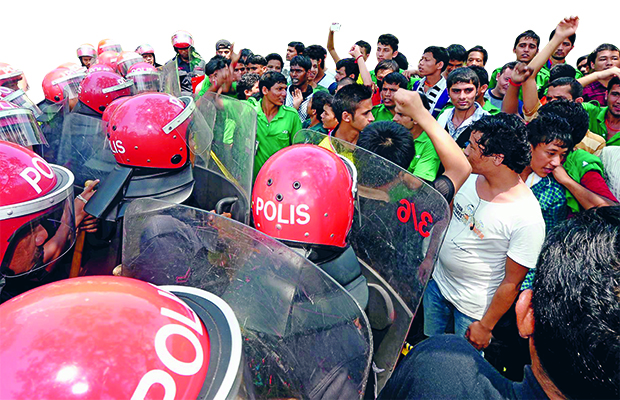Malaysia is one of Asia's biggest employers of foreign labour. But recently, cases of deaths, abuse and forced labour have come to light. What is going on? Who is protecting these migrant workers?

Police had to be called in to quell a riot by Nepalese workers at the JCY plant in Johor Bahru last week
By Pauline Wong
What would you do if you employer forced you to play game of ‘catch the ball’, where if you dropped the ball, you’d get physically punish with punch or kick?
Who would you turn to if your boss decided to make you work long hours with no extra pay to punish you for questioning why he took your passport away?
Would you stay with an employer who put hot iron on your breasts or poured boiling water on you?
Of course not, you’d say, but these are the things some of the 2.3 million foreign workers in our country have had to endure for decades, with little recourse or redress. And from what recent incidents tell us, their tolerance has its limits.
Malaysia, a nation which prides itself on being modern, sophisticated and ‘developed by 2020’ is notorious for treating its foreign workers like modern-day slaves. From withholding their passports to reneging on work contracts, Malaysia is getting a bad reputation from the misbehaviour of some ‘black sheep’ employers.
Treated too badly, for too long
Aside from the thousands of cases of violations of human rights of migrant workers handled by non-governmental organisations like Tenaganita, stories of how workers’ passports are withheld and horrific working conditions are commonplace in newspapers and news portals.
Of course, those responsible for criminal acts on their charges have faced the full extent of the law. Among them:
➤ In March, a couple was sentenced to be hanged for starving their Indonesian maid to death. Fong Kong Meng, 58 and wife Teoh Ching Yen, 56, had starved Isti Komariyah, 26, over three years to a skeletal 26 kg at the time of her death in June 2011, in a case of abuse which shocked the nation. She also had scratches and bruises on her back, arms and forehead.
➤ In 2008, former air stewardess Yim Pek Ha was sentenced to 18 years jail for abusing her Indonesian maid Nirmala Bonat, who had suffered injuries to her face, torso, breasts and arms from being scalded with hot water and beaten with a hot iron 10 years ago.
➤ Last year, businessman Mohd Shukur Suradi was sentenced to 15 years’ jail and 10 strokes of the rotan while his wife Daeng Norulasyikin Bachok, was jailed for 15 years. They were convicted of causing grievous hurt to their maid, Marsini, 22, with knife, golf stick, belt, hot oil, cloth hanger, ladle and hot spoon.
As a result of these abuses, Indonesia in 2009 issued a ban on sending its domestic workers to Malaysia, and
Cambodia followed suit in 2012. And The Heat learnt that another country may follow suit soon if problems faced by its citizens here are not resolved.
Our dependence on foreign labour has been likened to an addiction, where we can no longer do without them to build houses, mega buildings or projects, wash dishes, cook food and to do work locals are unwilling to take up – namely, the four ‘D’ jobs: dirty, dangerous, dull or demeaning.
In a 2013 Labour Force Survey by the Statistics Department, it was reported that 13.4% of our labour force consists of foreign workers and as of 2012, according to the Human Resources Ministry’s annual report, there are still 1.6 million job vacancies in Malaysia.
As of August 2011, a total of 2,320,034 foreign workers and illegals were registered using the biometric system under the 6P amnesty programme.
To put things into perspective, the Statistics Department states that about 7% of our population are Indians, that is, about 2.1 million. This means there are more foreign workers than there are Malaysian Indians in our country.
Thus far, despite the ill-treatment, foreign workers often seek help from Tenaganita or Migrant Care, or direct their grievances to their respective embassies. But things may be coming to a head, and the fire may have been lit under the fuse of long-suppressed anger and frustration.
Violence breaks out
Last month alone, there were three outbreaks of violence by foreign workers.
On Aug 26, about 1,000 Nepalese factory workers set fire to their employers’ car and ti the JCY HDD Sdn Bhd factory in Kulaijaya, Johor, allegedly over ill-treatment and abuse. This incident had followed what was reportedly a small riot three days prior at the same company’s factory in Tebrau.
In a report by MalaysiaKini, parent company of JCY HDD, JCY International Bhd, clarified that the company had moved 23 workers from Tebrau to Kulai after the earlier riots to “calm” the situation in Tebrau.
It is believed the riot in Tebrau was over the death of a worker, Karka Bahadur Nirbula, from a sickness, allegedly due to the lack of medical treatment.
The company did not address the allegation of Karka’s death, but only stated that there us a 24-hour clinic in the Tebrau factory. It further said it complied with all regulations set by Malaysian labour law, including the minimum wage of RM900.
The electronics company also said that Kulaijaya workers can go to the panel clinics without restriction. It also said that it will now raise its compensation for workers who die on the job by paying the remainder salary from their tenure or RM10,000, whichever is higher.
But PKR state assemblyman for Bukit Batu Jimmy Puah told a different story. In a letter which was published on several news portals, he said he was informed that the foreign workers had been subjected to harsh treatment and questionable wage deductions.
“The spark that started the riot was actually when the management sought to ‘reform’ 20 workers transfer from Tebrau branch, by playing a ‘catch the ball’ game in which a round sandbag resembling a ball weighing around 5-7 kg was tossed around among the workers. Whoever dropped the ‘ball’ would be physically punished either by a punch, a kick or even worse, by beating them with stick,” Puah said.
“At this juncture, I can only say this is an alleged event and it is under police investigation but sure there cannot be smoke without fire. If it is indeed proven to be true, then this surely is one of the sickest games to be played and a throwback to the brutal labour treatment of the late 19th century,” he added.
A few days after the Kulai riot, four workers in Kajang set fire to a restaurant where they working, allegedly due to unpaid salaries. In the Kajang case, the workers had apparently loaded tables, chairs, and kitchenware onto lorry before they set the restaurant ablaze.
The fact that these three incidents took place almost around the same time perhaps indicated the problem is becoming more acute. But they are no means the first.
Perhaps the one that shook Malaysia took place in January 2002, when some 400 Indonesian textile workers staged a violent protest at their factory in Nilai, Negri Sembilan after police tried to detain their co-workers for drug abuse.
A local narcotics officer said the workers began to riot after urine tests for drug abuse were completed on 200 workers. The rioters overturned a police truck, van and a police car and then retreated to their five-storey hostel block and threw chairs, tables, bottles and stones, he added.
Parti Sosialis Malaysia (PSM) later said the riot was a manifestation of social problems as there were allegations of police harassment and issues like poor hostel facilities and worker welfare.
In March last year, Bernama reported that Muar police had foiled an attempt by 5,000 foreign workers from Nepal to hold a demonstration at the town centre to protest against their employers for allegedly failing to pay salaries according to the minimum salary scheme.
A week earlier, Muar police also arrested 32 Nepalese workers for causing a riot at a furniture factory for the same reason – they were not paid the minimum salary fixed by the government.
In that same month, 500 workers held a protest at a Nilai textile factory for the same reason.
The Singapore experience
Singapore suffered the same problem last December when a violent riot broke out in Little India. Over 300 workers, believed to be Indian nationals, damaged numerous emergency vehicles and set them ablaze.
The incident was triggered when a bus driver removed a worker from his bus for being intoxicated and rowdy. The same worker was killed when a bus ran him over. The death of the worker sparked a riot which lasted over two hours and injured 40 people before riot police and authorities ended it.
Reports that came from an analysis of the riot – the first in Singapore since 1969 – suggested that long pent-up anger and frustration over worker rights violations, and intoxication, had caused the riot.
Russel Heng, the president of a migrant workers’ group in Singapore, Transient Workers Count Too (TWC2) in a column for the Straits Times said that “when a community harbours and underlying grievance, the threshold for tipping into anti-social acts is lower”.
“The foreign worker communities here have been at the receiving end of employment unfairness for a long time. Many do not receive correct salaries, or have no way – in the absence of payslips – to check whether they have been correctly paid. Some have not been paid months; TWC2 sees a regular stream of such complaints.
“Other workers have been seen their friends injured at work, but denied proper medical treatment by their employers. Yet others have seen their friends repatriated suddenly without receiving full salaries or injury compensation,” he wrote.
Singapore, widely acknowledged to be developed nation which has some of the strictest employment laws in the region, was shocked by the riots. Any sort of violence or protest is practically unheard of there, and as a result, the Singapore government was ill-equipped to handle it, banning alcohol in Little India while pondering over what they had done wrong.
Looking back to our shores, the Kulai riot and others before it may be warning bell, one which we ignore at our peril. When people are desperate and angry, there can be no telling what they’ll do.
A change in attitude
One could argue that foreign workers are often problematic and prone to committing crime. We often hear of employers lamenting about runaway maids, or of our friends complaining about the rowdy foreign workers crowding KLCC park on public holidays. Sometimes, we refer them in derogatory names.
But the fact of the matter is, only 10% to 15% of all crime in the country is committed by foreigners, according to then-Defence Minister Datuk Seri Zahid Hamidi.
Not all foreign workers are good, of course, just as not all employers are bad. But that does not detract from the fact that we need to have legislation which will protect their rights, treat them as equals and not as modern-day slaves.
How can we stand by and watch them be treated like slaves when we rely on them for everything from construction for the service industry?
A kitten will fight like a lion if cornered, and if all the foreign workers in our country simultaneously decide they’ve had enough with a potentially explosive situation.
Source: The Heat
Address: Wisma MTUC,10-5, Jalan USJ 9/5T, 47620 Subang Jaya,Selangor | Tel: 03-80242953 | Fax: 03-80243225 | Email: sgmtuc@gmail.com.com
